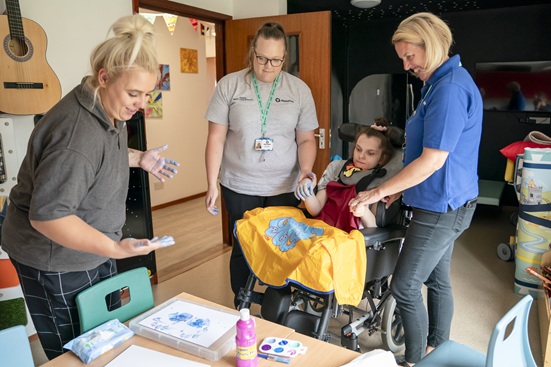What do hospices actually do?
A guide to hospice care in the UK
When most people hear “hospice,” they think of a place where people go to die. It’s one of the biggest misconceptions about hospice care.
The reality is far different and far more hopeful. Hospices are places where people live well with life-limiting illnesses, where families find support and respite, and where expert teams work to improve quality of life at every stage. Here’s what hospices really do.
Let’s start with what hospices aren’t: they’re not just places for dying. Many people who receive hospice care live for months or even years after their first appointment. The focus is on living as well as possible with a life-limiting condition, managing symptoms, and supporting both patients and their families.
Who Works in Hospices?
Hospices employ teams of specialists who understand exactly what people with life-limiting illnesses need:
Specialist nurses trained in palliative care who focus on pain management and symptom control
Doctors with expertise in life-limiting conditions who work alongside patients’ existing medical teams
Physiotherapists helping people maintain mobility and independence for as long as possible
Occupational therapists adapting homes and daily routines to make life easier
Social workers providing practical support with benefits, housing, and family concerns
Chaplains and counsellors offering emotional and spiritual support (regardless of faith)
Trained volunteers who provide companionship, practical help, and specialist skills
This isn’t a hospital environment – it’s a team built around understanding what matters most to people facing difficult diagnoses.
What Services Do Hospices Provide?
Inpatient care Some hospices have beds for people who need round-the-clock specialist care. This might be for pain management, respite, or end-of-life care. Stays can be days, weeks, or longer depending on individual needs.
Day services Many people attend hospice day centres regularly whilst living at home. These services include medical appointments, therapies, social activities, and meals. It’s about maintaining independence and quality of life.
Home care Hospice nurses visit people at home, providing specialist care in familiar surroundings. This can include pain management, emotional support, and practical advice for family members.
Respite care One of the most vital but least known services. Hospices provide short-term care so that family carers can take breaks, go on holiday, or simply have time to themselves. Caring for someone with a life-limiting illness is exhausting – respite care helps families cope.
Bereavement support It doesn’t end when someone dies. Hospices provide counselling and support groups for families, both before and after bereavement. This can last for months or years.
Family support Hospices work with entire families, including children. They provide counselling, practical support, and help explaining difficult situations to young people.
Complementary therapies Many hospices offer massage, aromatherapy, reflexology, and other therapies that help with pain, anxiety, and general wellbeing.

Who Uses Hospice Services?
Hospices support people with any life-limiting illness, including:
- Cancer (the largest group, but not the only one)
- Heart disease in advanced stages
- Lung disease including COPD
- Neurological conditions like motor neurone disease, multiple sclerosis, and Parkinson’s
- Kidney or liver disease in later stages
- Dementia and other cognitive conditions
Hospices care for people of all ages – from children to grandparents. What brings people to hospice care isn’t that they’re dying soon, but that they’re living with a serious illness that could shorten their life. Many people receive hospice support for months or even years.
How Are Hospices Funded?
This is where the picture becomes challenging. Most hospices are only partly funded by the NHS. The rest comes from:
- Individual donations from people in local communities
- Fundraising events from charity walks to gala dinners
- Charity shops run by volunteers
- Gifts in wills which provide longer-term financial stability
- Corporate partnerships with local businesses
- Grants from charitable foundations like Hospice Aid UK
This funding gap means hospices constantly need support to maintain their services. When a hospice needs new equipment, additional staff training, or emergency funding, they turn to us for help.

Why This Matters
Knowing what hospices really do helps explain why they need ongoing support. These aren’t luxury services – they’re essential care that helps people live with dignity, reduces pressure on hospitals, and supports families through incredibly difficult times.
Every hospice has a waiting list. Every hospice has equipment that needs replacing or updating. Every hospice has staff who need specialist training to provide the best possible care.
How Hospice Aid UK Helps
This is where charities like Hospice Aid UK make a real difference. We provide urgent grants when hospices need:
- Medical equipment like specialist beds, mobility aids, and pain management devices
- Staff training in new techniques and treatments
- Emergency funding when unexpected needs arise
- Capital improvements to make hospices more comfortable and accessible
Getting Involved
If you’d like to support hospices in your community, there are plenty of ways to help:
- Donate directly to hospices near you
- Support grant-giving charities like Hospice Aid UK that help multiple hospices and offer a real lifeline for urgent appeals
- Volunteer your time and skills
- Fundraise through events or challenges
- Simply spread awareness about what hospices actually do
Most people only learn about hospices when they or someone they love needs care. By then, families are dealing with diagnosis, treatment, and emotional upheaval. The more people know about hospice care in advance, the sooner people can access the support that’s available.
Hospices aren’t about giving up – they’re about living well, whatever time you have.


